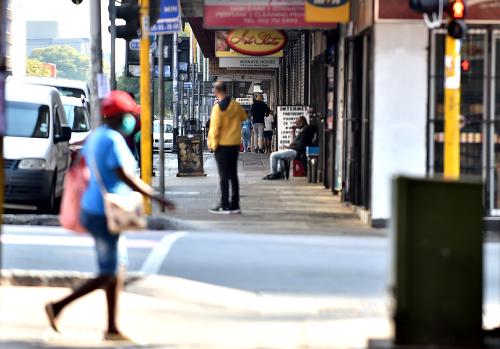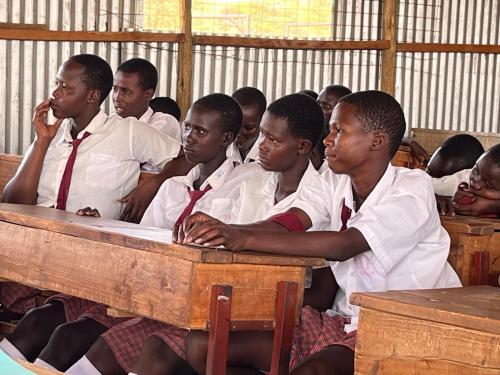New definition measures South Africa’s GDP 11% higher than previously thought
This week, authorities in South Africa announced that the country’s economy is 11 percent larger than previous estimates after Statistics South Africa altered its method for calculating gross domestic product. The national statistical service’s new definition utilizes a refined, more modern classification of activities, new sources of information, and a new reference year (2015 instead of 2010). The new definition also changed estimates for other key variables, including household consumption relative to GDP and GDP per capita, which became 16 percent and 9 percent higher, respectively. This higher GDP also means that Africa’s (still) second-largest economy has a lower debt burden than previously thought. According to Annabel Bishop, chief economist at Investec Bank Ltd, the new definition suggests that South Africa’s debt-to-GDP ratio will remain below 80 percent through 2023-2024, whereas earlier estimates had it at 87.3 percent by that time. For more on South Africa’s debt burden and how the country’s economy has fared during the pandemic, read “From stimulus to debt: The case of South Africa.”
Meanwhile, South Africa’s unemployment rate has become the highest in the world, according to Bloomberg, which regularly monitors the indicator in 82 countries. The unemployment rate increased to 34.4 percent in the second quarter of 2021, up from 32.6 percent in the first quarter. South Africa is not the only country in the region with such high unemployment rates: The country’s jobless mark barely eclipses fellow sub-Saharan African countries Namibia (33.4 percent) and Nigeria (33.3 percent), which rank second and third in Bloomberg’s database. An expanded measure of unemployment, which includes those available for but not seeking work, reached 44.4 percent in South Africa, an increase of 1.2 percentage points from the first quarter. For recommendations for policies to create jobs for youth in South Africa, see “Solving South Africa’s unemployment: Could tourism, horticulture, agro-processing, or logistics hold the key?“
New energy projects announced, including transforming landfills in Rwanda, expanding solar and wind capacity, and building and upgrading nuclear power plants
This week, the Rwandan capital of Kigali announced a new environmentally friendly project that aims to use the Nduba landfill to generate energy for the national grid. In 2020, the area was designated an environmental and health hazard, and this new project will transform the landfill so that it will capture gases (such as methane) that it produces and convert those gases into power instead of releasing them into the air. The solid waste can also be turned into other materials like plastic and repurposed into items like bricks, electric poles, and chairs. According to The New Times, the capture and use of landfill gas, the transformation of waste to energy, and aerobic composting can all make major contributions to the reduction of gas emissions that cause global warming. Overall, the government plans on investing $28 million in projects that can utilize gas landfills for power generation and which are also expected to create new green jobs.
The government argued that such action is essential as Rwanda’s cities undergo rapid urbanization—the population of Kigali alone has skyrocketed from just over 600,000 people in 2002 to 1.6 million in 2021.
At the launch, Environment Minister Jeanne d’Arc Mujawamariya explained the reasoning and outlined hoped-for next steps in the effort: “The waste should not be wasted. We should turn waste into revenues. Once investors generate revenues from recycling waste, we will work with them to reach the level of providing incentives to households.” The project is part of an agreement between Rwanda’s Ministry of Environment and the government of Luxembourg and is also a part of efforts to strengthen diplomatic ties and aid in the transfer of technology between the two nations.
Other renewable energy sources like solar continue to grow throughout the continent. Investment companies Gridworks and New GX have announced investments of $40 million into the company Sustainable Power Solution Investments (SPS), which will be used to build additional solar plants that can collectively generate 100 MW of power across sub-Saharan African countries, especially Ghana and Nigeria. The investment in SPS is Gridworks’ second since 2019, when it committed $31 million to facilitate the installation of 45 MW of solar energy across the region.
In related news, South Africa moved forward with plans to expand its solar and wind capacity by 2.6 GW and, this month, received 102 bids from companies for such projects. The Department of Mineral Resources and Energy, which will fund the projects, said that it would announce the successful bidders in October and November of this year, and the winners must complete the projects by April 2024.
Also as part of efforts to reduce the country’s dependance on carbon-intensive energy sources, South African energy regulators are looking to increase the country’s nuclear energy capacity. Last week, Mineral Resources and Energy Minister Gwede Mantashe announced plans to build a new 2,500 MW nuclear power plant by 2024. The announcement was met with some early opposition, though, with the civil society group Organization Undoing Tax Abuse (OUTA) arguing that the project is “not affordable, not appropriate and should not be approved.”
South Africa currently has the continent’s only nuclear plant, the Koeberg Nuclear Power Plant near Cape Town, which generates 5 percent of the country’s electricity. Notably, a new $1.2 billion program was recently launched to extend the operating life of that plant, which will involve replacing six steam generators and forced air cooler units, as well as perform needed maintenance on the turbine system. The modifications are expected to extend the operational life of the plant, which has been connected to the national grid since 1984, by 20 years.
Nigeria deepens relationships with Russia, South Korea
This week, Nigeria and Russia signed a military cooperation agreement that details the framework for the supplying of equipment from and training of troops by Russia to the West African country. According to the Nigerian ambassador to Russia, President Muhammadu Buhari feels Russia can aid Nigeria in defeating Boko Haram, which continues to contribute to insecurity in northern Nigeria.
This deal is another step in the strengthening of ties between the two countries: For example, in October 2019, Russia hosted its first summit with Africa that included 43 heads of state or government, with the purpose of reviving the economic, political, and military influence of Russia in Africa. At the summit, Russia made the first of many security and economic deals, including a contract to supply attack helicopters to Nigeria. For more on the Africa-Russia relationship see the 2019 op-ed, “Vladimir Putin is resetting Russia’s Africa agenda to counter the US and China.”
In related news, Nigeria and South Korea have been working to expand their political, economic, and defense relationships, as recently demonstrated by the visit of Korea’s First Vice Minister of Foreign Affairs Choi Jong Kun to Nigeria early this week. In fact, during his visit, Kun stated that, COVID situation pending, within the next five years, he wants to see a direct flight between the capitals of both countries, as well as increased cultural collaboration, technology, education, and trading. The two countries are looking to cooperate on security issues as well, as Kun and the Nigerian Minister of Transportation Rotimi Amaechi met to discuss maritime security during the visit.
This trip was another step in Korea’s pursuit of a long-term, mutually beneficial relationship with Africa in recent years: For example, Korea has sent $200 million in masks and medical equipment to the continent to aid its fight against COVID-19. In March of this year, the South Korean Ambassador to Nigeria stated that the embassy of South Korea was interested in a joint program for children as well as other cultural programs to aid Koreans in understanding Nigerians culturally. The Korea International Cooperation Agency (KOICA) has also been rapidly increasing its aid to the region since 2016.
The Brookings Institution is committed to quality, independence, and impact.
We are supported by a diverse array of funders. In line with our values and policies, each Brookings publication represents the sole views of its author(s).









Commentary
Africa in the news: South African economy, energy production, and Nigerian foreign relations updates
August 28, 2021